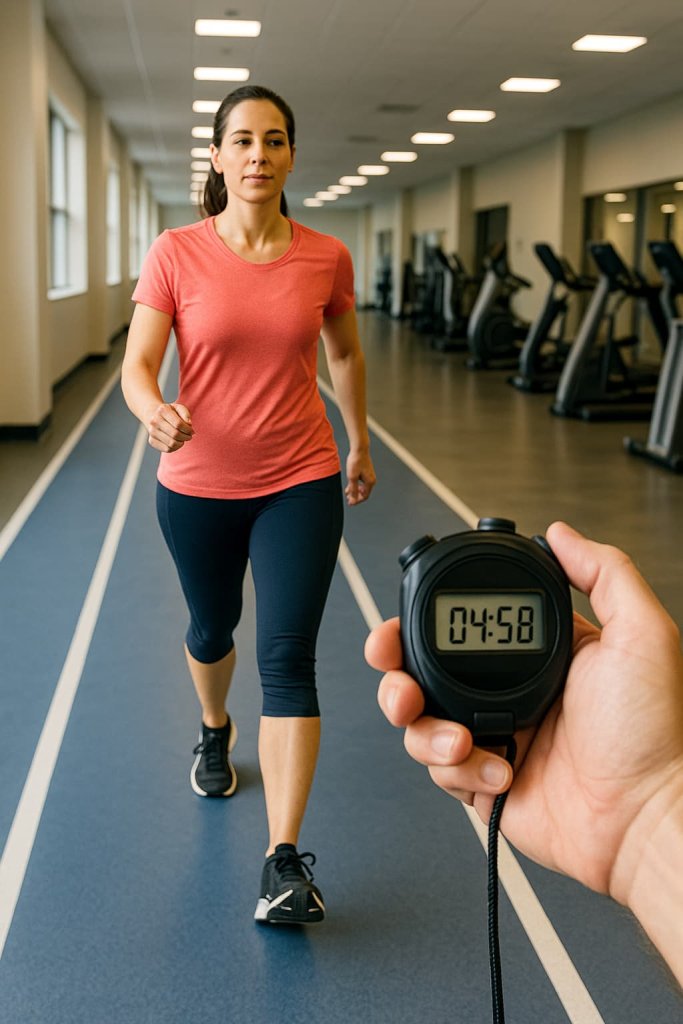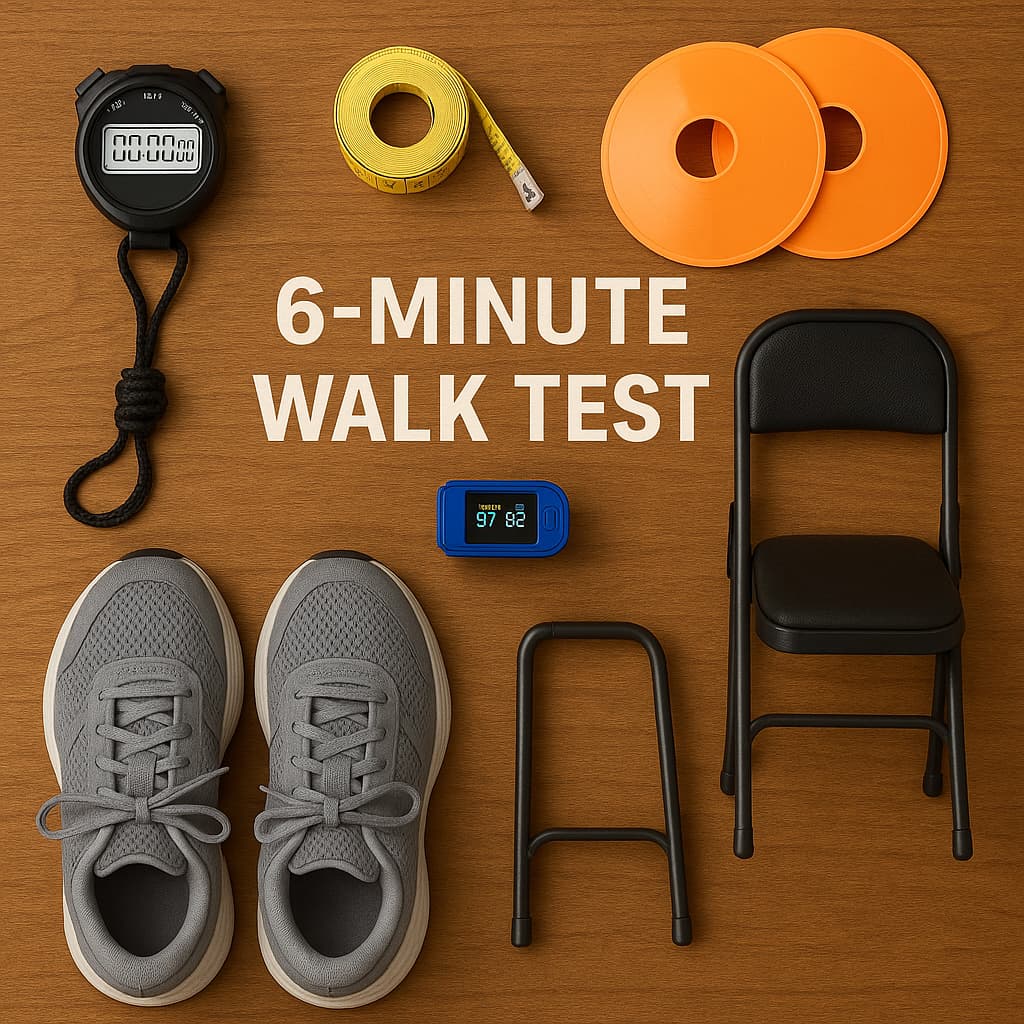The 6-Minute Walk Test (6MWT) is a simple yet powerful method to measure your daily fitness and endurance using minimal equipment. All you need is a stopwatch, a flat walking track, and a few simple tools. In just six minutes, you can assess how well your heart, lungs, and muscles work together—giving you a reliable snapshot of your overall health and mobility.

The test is widely used in hospitals, rehabilitation centers, sports science labs, and by physiotherapists. But it’s also adaptable for home use if done carefully. Understanding your results can help you:
- Detect changes in your fitness level
- Track progress in recovery or training
- Adjust exercise plans effectively
- Recognize early signs of possible health issues
By following the correct procedure, you can turn this test into a personal health benchmark—no expensive gym membership or specialist equipment required.
What Is the 6-Minute Walk Test?
The 6MWT measures the distance you can walk on a flat, straight surface in exactly six minutes. The test was standardized by the American Thoracic Society in 2002 and is recognized worldwide.
It is designed to evaluate:
- Cardiorespiratory fitness — how well your heart and lungs deliver oxygen
- Endurance — your ability to maintain effort over time
- Functional capacity — how capable you are in performing daily tasks
- Treatment outcomes — to see if medical or fitness interventions are improving performance
Unlike maximal effort tests like treadmill stress tests, the 6MWT is submaximal, meaning it reflects everyday activities such as walking to the shop or climbing stairs, rather than pushing your body to its absolute limits.
Reference: Full clinical protocol available at American Thoracic Society – 6MWT Guidelines.
Equipment You’ll Need for the 6MWT

To conduct an accurate and safe test—whether at home, in a gym, or in a clinic—have the following ready:
- Stopwatch or timer – to track the exact six minutes
- Measuring tape or a pre-measured track – to calculate total distance walked
- Marker cones or tape – to clearly mark turnaround points
- Comfortable walking shoes – to prevent discomfort or injury
- Loose-fitting clothing – for unrestricted movement
- Pulse oximeter (optional but recommended) – to monitor oxygen saturation (SpO₂) and heart rate before and after
- Chair – positioned nearby in case of sudden fatigue or dizziness
These items are inexpensive, widely available, and can make your testing more accurate, safe, and consistent.
Step-by-Step Guide to Performing the 6MWT at Home
⚠️ Safety Note: If you have heart disease, lung conditions, mobility issues, or other health concerns, consult your doctor before doing this test. Stop immediately if you feel chest pain, dizziness, or severe shortness of breath.
1. Preparation
- Choose a flat, straight path at least 20–30 meters long (indoors or outdoors)
- Remove any trip hazards
- Place marker cones or tape at each end
- Ensure good lighting and ventilation
- Have water and a chair available for post-test recovery
2. Before the Test
- Rest for at least 10 minutes
- Record baseline:
- Heart rate
- Oxygen saturation (if using pulse oximeter)
- Borg Scale breathlessness score (0–10)
- Borg Scale leg fatigue score (0–10)
- Wear comfortable clothing and shoes
- If someone is assisting you, explain their role (time checks, encouragement, safety watch)
3. Starting the Test
- Begin walking at a brisk but steady pace
- Aim to cover as much distance as possible without running
- You may slow down or stop, but the clock keeps running
- Resume walking as soon as you feel able
4. During the Test
- An assistant (if present) should call out time remaining at each minute
- Standard encouragement phrases can be used:
- “You’re doing well, keep going.”
- “Halfway done, 3 minutes left.”
- “Just one more minute—finish strong!”
5. Ending the Test
- Stop walking immediately when the 6 minutes are up
- Mark your end position and measure total distance walked
- Record post-test:
- Heart rate
- Oxygen saturation
- Breathlessness score
- Leg fatigue score
Normative Values for the 6MWT
| Age Group | Men (Avg Distance) | Women (Avg Distance) |
|---|---|---|
| 20–39 yrs | 639 m ± 84 | 612 m ± 85 |
| 40–59 yrs | 612 m ± 92 | 580 m ± 92 |
| 60–69 yrs | 572 m ± 92 | 538 m ± 92 |
| 70–79 yrs | 527 m ± 88 | 471 m ± 91 |
Interpretation Tip: Healthy adults generally walk between 400–700 meters. A difference of ±50 meters between two tests is considered clinically meaningful (Respiratory Research, 2022).
Benefits of the 6MWT
- Monitors fitness progress – Great for tracking monthly endurance improvements
- Early detection of health decline – Useful in chronic conditions
- Motivates exercise – Clear distance goals encourage consistency
- Cost-effective – Requires minimal equipment
- Safe for most age groups – Adaptable for seniors, athletes, and rehab patients
Pro Tips for Accurate & Consistent Testing
- Keep conditions the same – Same track length, same time of day, same shoes
- Avoid big meals before testing – Eat light to avoid discomfort
- Stay hydrated – Drink water before and after
- Record results – Use a notebook or fitness app
- Repeat regularly – Every 4–6 weeks for tracking progress
FAQs
1. Can I run during the 6MWT?
No—running changes the purpose of the test. It must reflect walking ability.
2. What’s the ideal track length?
30 meters is best, but 20 meters is acceptable with more turns.
3. Is it safe for seniors?
Yes—with supervision and optional use of a pulse oximeter.
4. How often should I repeat it?
Every 4–6 weeks for fitness tracking, or as directed by your healthcare provider.
5. Can I do this on a treadmill?
Not recommended—outdoor or indoor track walking is more accurate for functional ability.
6. What’s considered a “good” score?
For healthy young adults, 600+ meters is common. For older adults, results will vary by age and health.
Conclusion
The 6-Minute Walk Test is a practical, low-cost, and science-backed way to monitor your endurance and cardiovascular health. With just a stopwatch, measuring tape, marker cones, and comfortable shoes, you can assess your fitness in a safe, real-world setting.
Whether you’re an athlete fine-tuning training, a patient in recovery, or simply someone curious about their health, the 6MWT offers clear, measurable results that can guide your journey toward better fitness and improved quality of life.
